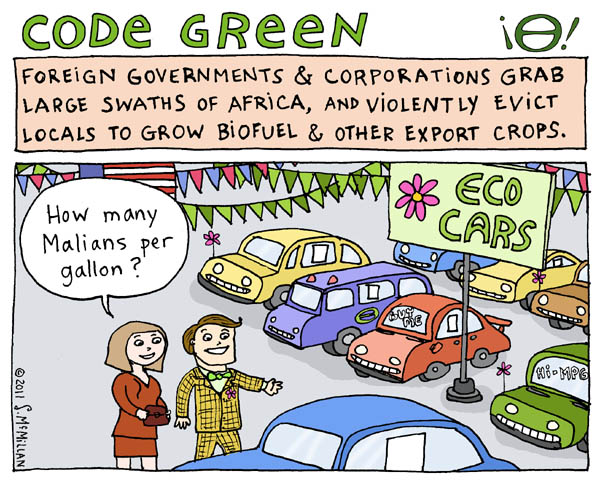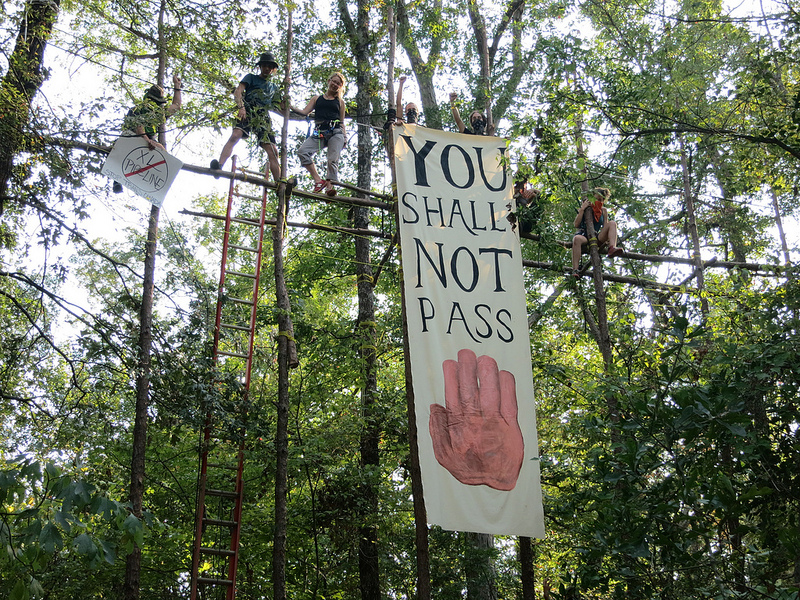
by Deep Green Resistance News Service | Oct 16, 2012 | Obstruction & Occupation
By Candice Bernd / TruthOut
More than 50 blockaders tried to re-enter the site of what has become a historic standoff Monday, to expand and support the ongoing Tar Sands Blockade tree village in east Texas.
Several managed to break through police lines to attempt to re-supply activists who have been occupying trees in the pathway of the Keystone XL pipeline since September 24. The rest of the blockaders rallied nearby, blocked by police and TransCanada’s hired security, who have formed a human barrier around the pipeline easement.
Two blockaders have locked themselves to construction equipment, and six blockaders have been arrested so far today.
Blockaders have been trying to negotiate with security hired by TransCanada to get food and water to activists occupying the trees in the path of the Keystone XL pipeline, to no avail. Now they are taking a stand together to get supplies to the activists occupying the tree-sit so they may maintain their standoff.
The activists were gathered at the location in Winnsboro after spending the weekend at a direct-action camp hosted by Tar Sands Blockade. Activists traveled from across the country and were trained in climbing, media relations, organizing and body blockade techniques.
“Coming out here had been one of the more inspiring things that I have done in years now,” says Toby Potter, a member of the environmental organization, Earth First!
Potter helped lead workshops over the weekend for camp participants in lockdowns and body blockades. “It gives me a lot of hope, seeing all this resistance from the area … and from around the country, and knowing that there’s [sic] other fights against tar sands at the same time.”
Potter helped camp participants erect a 30-foot wooden tripod used by activists who sit at the top of it during a blockade action. Many of the weekend’s campers participated in Monday’s blockade in Winnsboro to defend the tree village.
TransCanada filed a Strategic Lawsuit Against Public Participation (SLAPP) last week, naming 19 individual defendants, three organizations, and another six unidentified tree-sitters. The broad civil action seeks an injunction, declaratory relief and damages.
Most of the defendants have been arrested in previous Tar Sands Blockade actions. Ron Seifert, the Blockade’s media spokesman, was also named, although he has not yet been arrested in connection with the ongoing protest. Actor Daryl Hannah, who was arrested while defending Area Landowner Eleanor Fairchild’s home, is not named in the SLAPP suit. Fairchild, however, is named in the suit.
Another activist, going by the name Kevin Redding due to security concerns, recently escaped arrest at a secondary tree-sit the Blockade launched last week at West End Nature Preserve outside Mt. Vernon, Texas, where TransCanada had announced plans to cut trees.
“I’ve lived in Texas my whole life, and when I heard about TransCanada putting the pipeline through, I didn’t like the idea of any part of Texas having a tar sands pipeline going through it,” Redding told Truthout. “I’ve been here for a long time, and I don’t plan on going anywhere.”
Redding said local police tried to intimidate him, as he sat in a tree, with threats that he would be charged with terrorism. When company representatives said they would under-bore through the preserve, rather than cut trees in the ecologically sensitive area, the activist left the site, unobserved.
Monday’s action comes on the heels of an ongoing police crackdown not only on the tree-sitters, but also on journalists trying to tell their story. Two New York Times reporters were detained Oct. 10 while covering the tree-sit. They were released after identifying themselves as media.
Read more from TruthOut: http://truth-out.org/news/item/12121-fresh-recruits-more-arrests-begin-week-four-in-texas-tar-sands-blockade
by Deep Green Resistance News Service | Oct 15, 2012 | Biodiversity & Habitat Destruction, Indigenous Autonomy, Protests & Symbolic Acts
By Terri Hansen / Intercontinental Cry
A fleet of boats piloted by Native and non-Native fishers gathered today in the waters off Xwe’chi’eXen (Cherry Point, Wash.) to stand with the Lummi Nation in opposition to the proposed Gateway Pacific coal terminal at Xwe’chi’eXen.
“We have to say ‘no’ to the coal terminal project,” said Cliff Cultee, Chairman of the Lummi Nation. “It is our Xw’ xalh Xechnging (sacred duty) to preserve and protect all of Xwe’chi’eXen.”
A ceremony of thankfulness, remembrance and unity was held on the beach during the event. Lummi Indians maintain the largest Native fishing fleet in the United States, and Lummi fishers have worked in the Cherry Point fishery for thousands of years.
If constructed, the terminal would be the largest coal terminal on the West Coast of North America. It would significantly degrade an already fragile and vulnerable crab, herring and salmon fishery, dealing a devastating blow to the economy of the fisher community.
“This is not about jobs versus the environment,” said Jewell James of the Lummi Nation’s Sovereignty and Treaty Protection Office. “It is about what type of jobs are best for the people and the environment.”
Another gathering of Lummi Indians and non-Indian residents from the local and regional community was held at Xwe’chi’eXen on Sept. 21 to call for the protection and preservation of Xwe’chi’eXen, which is the location of a 3,500 year old village site, and a landscape that is eligible for registry on the National Register of Historic Places.
A Lummi Nation Business Council Resolution declared Lummi “will continue to safeguard our ancestral and historical areas” and the ability of its members to “exercise treaty, inherent and inherited rights.”
The Lummi Nation is participating in a broad intertribal coalition to defeat the project and to ensure that the natural and cultural legacy of Xwe’chi’eXen is protected in perpetuity.
From Intercontinental Cry: http://intercontinentalcry.org/native-and-non-native-fishers-join-lummi-nation-in-opposing-proposed-coal-terminal-at-cherry-point/

by Deep Green Resistance News Service | Oct 12, 2012 | Climate Change
By Inderscience Publishers
Biofuels will serve the interests of large industrial groups rather than helping to cut carbon emissions and ward off climate change, according to research to be published in the International Journal of Environment and Health this month.
Simone Vieri of the University “La Sapienza” of Rome, Italy, explains that, in its policies to combat climate change, the European Union has planned to increase to 10% the share of fuel derived from biofuels on the market by 2020. It has focused attention on first-generation biofuels, made from the conversion of plant material which can be grown specifically for fuel production, such as corn, soy, sugarcane or palm oil. It has given only a secondary role to second-generation biofuels, made from agricultural and woody crop biomass, including waste and by-products.
Vieri suggests that, “In 2020 the EU won’t be able to keep to its 10% biofuels goal using only European agricultural production, but will have to continue importing the greatest part of raw materials, or biofuels.”
In this frame, Vieri explains that, “The EU’s decision to focus on the first-generation biofuels, raises many doubts.” In particular, the approach seems to favour several issues. For instance, it favours production systems that are in competition with traditional agriculture for use of resources and production factors, he says. Additionally, to encourage agro-industrials models, such as those on which the production of first generation biofuels is based, might compromise the possibility of developing models based on multifunctional agriculture and, then, on the production of energy from agriculture waste and by-products rather than from dedicated products.
The adoption of first-generation biofuels sometimes leads to exploitation of human and environmental resources of poorer countries, adds Vieri, as they are commonly the source of many of the agricultural raw materials used for production of biofuels. Moreover, agricultural production processes that change land use can lead to zero net benefit in terms of emissions reduction.
Other problems that arise when reliance is placed on first-generation biofuels lie with the economics. Financial market speculation strengthens the link between the price of oil and the price of the main agricultural raw materials, Vieri says. Furthermore, an increase, or instability of agricultural products’ prices, weighs heavily on poorer nations and their food security.
In this context “the choice to promote first generation biofuels is an example of how politics places the protection of the interests and profit strategies of a restricted number of subjects before the costs and benefits to be had on a wider scale,” adds Vieri.
Vieri adds that the “green economy” model might break new ground if it were to prove able to facilitate reduced emissions and allow economic growth and development with direct benefit to society itself rather than the profits of multinationals.

by Deep Green Resistance News Service | Oct 10, 2012 | Lobbying, Toxification
By Jeff Gray / The Globe and Mail
Chevron Corp. has lost a bid to have the U.S. Supreme Court consider its call for a worldwide ban on attempts to collect on a controversial $19-billion (U.S.) environmental judgment levelled against the company in Ecuador.
The decision comes with lawyers in Canada poised to battle in a Toronto courtroom next month over an attempt by the Ecuadorean plaintiffs to seize Chevron’s considerable Canadian assets to cover at least part of the massive judgment – a judgment the oil giant dismisses as fraudulent.
In the latest twist in a tangled legal saga, Chevron was trying to revive a preliminary injunction issued last year by a federal judge in New York. That injunction was later overturned on appeal. It purported to block the plaintiffs and their lawyers from trying to enforce the 2011 Ecuadorean court ruling not just in the U.S., but anywhere outside of Ecuador.
The U.S. Supreme Court refused on Tuesday to hear the case. It issued no reasons, as is customary, leaving the appeal court decision that quashed the injunction in place.
The news comes as lawyers for the plaintiffs – a group of villagers in the Amazon rainforest – have stepped up their campaign to force the oil company to pay for environmental damage from oil pollution in the Lago Agrio area of Ecudaor.
Chevron, based in San Ramon, Calif., has said it has virtually no assets remaining in Ecuador, and the plaintiffs have vowed to chase the company’s assets elsewhere. Their first stop, earlier this year, was Canada.
In May, they announced they had retained prominent Toronto lawyer Alan Lenczner, of Lenczner Slaght Royce Smith Griffin LLP, to try to have the judgment recognized by the Ontario Superior Court and force Chevron to fork over its Canadian assets, which include oil sands holdings. The plaintiffs have also filed a similar collection effort in Brazil.
In sprawling litigation in the United States, both sides have accused each of fraud and bribery in connection with the Ecuadorean ruling, allegations they both deny.
Chevron said Tuesday in an e-mailed statement that the company was disappointed with the decision but “will continue to defend against the plaintiffs’ lawyers’ attempts to enforce the fraudulent Ecuadorean judgment, and to further expose their misconduct in our pending [litigation] in New York and other proceedings.”
The plaintiffs’ say the ruling is the latest in a series of defeats for Chevron in U.S. courts.
“Chevron’s latest loss before the Supreme Court is an example of the company’s increasingly futile battle to avoid paying its legal obligations in Ecuador,” Aaron Marr Page, a lawyer for the Ecuadoreans, was quoted as saying in an e-mailed statement.
Read more from The Globe and Mail: http://www.theglobeandmail.com/report-on-business/industry-news/the-law-page/chevron-loses-bid-to-have-ecuador-case-heard-by-us-supreme-court/article4599707/

by Deep Green Resistance News Service | Sep 26, 2012 | Obstruction & Occupation
By Tar Sands Blockade
Nine people sitting 80 feet above ground in tree platforms on the path of TransCanada’s Keystone XL construction enter their third day of sustained action to stop the toxic tar sands pipeline. The sitters are undeterred by TransCanada’s role in the torture of their fellow blockaders.
Tuesday, Shannon Bebe and Benjamin Franklin delayed construction for most of the day when they locked arms around construction machinery, intent on protecting East Texas homes. The two were subjected to torture tactics by police only after TransCanada’s senior supervisors huddled with law enforcement to actively encourage the use of extreme pain compliance techniques on the peaceful protesters.
Immediately following TransCanada’s consultation, law enforcement handcuffed the protesters’ free hands to the heavy machinery in stress positions and proceeded to use sustained chokeholds, violent arm-twisting, pepper spray, and repeated tasering to coerce the two to abandon their protest. Extraordinarily, despite their torture, the two endured for over five hours, affirming their courageous stance that taking action now is less of a risk than doing nothing.
Upon the protesters’ arrest, TransCanada supervisors were seen and heard congratulating law enforcement on a job well done.
“TransCanada has frequently claimed its interest in protecting the safety of workers and protestors but now we can see that’s all a lie,” said Ron Seifert a spokesperson with Tar Sands Blockade. “Now that they have actively encouraged the torture of peaceful protestors its clear that this multinational corporation assigns no value to the basic humanity that all Texans and people everywhere deserve.”
With the news that their friends had been tortured with TransCanada’s approval, the eight original tree sitters were bravely joined by another, expanding the tree blockade further as TransCanada’s clear-cutting heavy machinery rapidly approaches. Construction is roughly 300 yards away from the tree blockade. All refuse to come down until TransCanada halts its dangerous pipeline project.
“I climbed this tree three days ago in the path of Keystone XL to demonstrate the dangers of this toxic pipeline and to let TransCanada know that we will continue to non-violently resist their brutal tactics,” said Justin Jacobs, an aerial blockader. “I’m here to defend this land from a multinational corporation who has blatant disregard for the safety of peaceful people, families, and our planet.“
Tar Sands Blockade is a coalition of Texas and Oklahoma landowners and climate justice organizers using peaceful and sustained civil disobedience to stop the construction of the Keystone XL tar sands pipeline.
Concluding hours of hard-fought Keystone XL construction delays, Benjamin Franklin shared, “In light of everything that happened at the direction of TransCanada, I still don’t regret my involvement at all. I encourage everyone to persevere in the face of this type of sheer brutality. To follow one’s moral compass despite extreme challenges is the way we move forward towards a more humane, tar sands-free planet.”
From Tar Sands Blockade: http://tarsandsblockade.org/press/press-releases/




